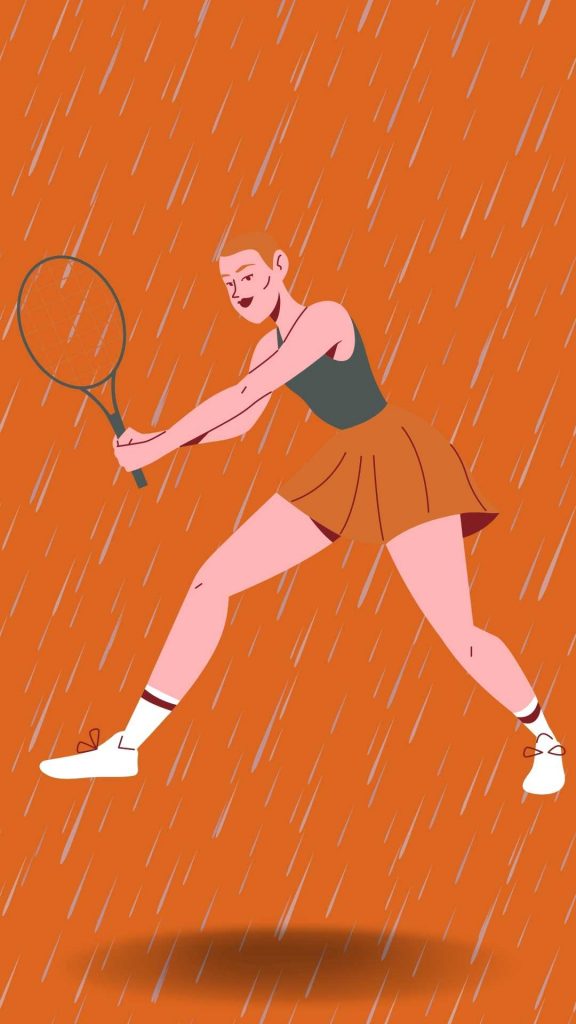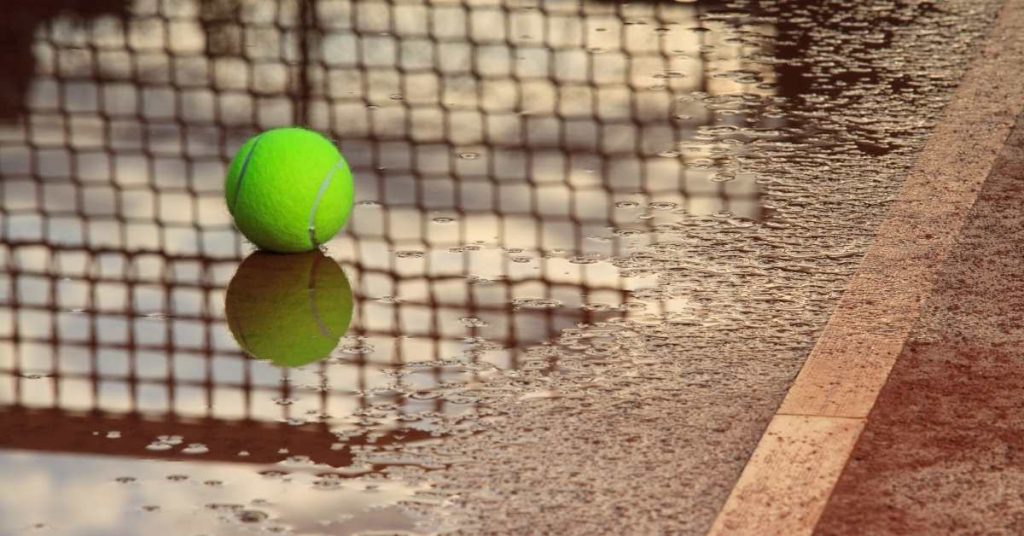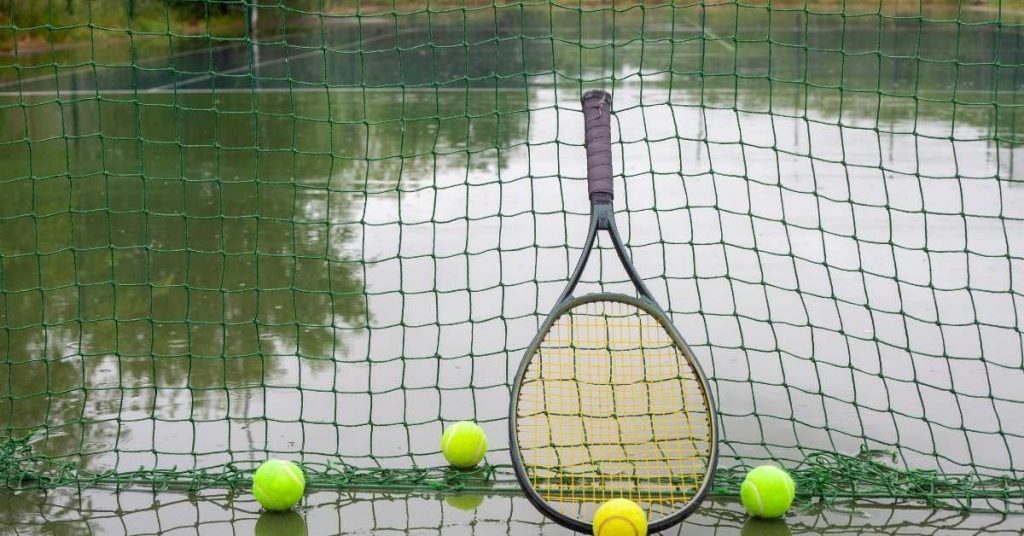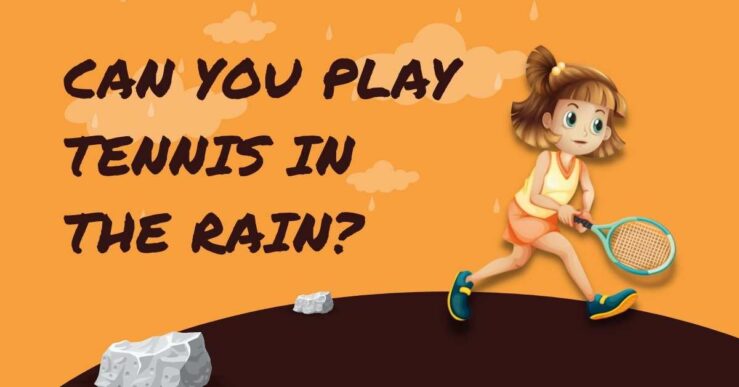As fantastic as tennis is, it is primarily played outside, where one thing that is not present indoors is the weather conditions. When I meet new tennis players, the weather is usually a major question mark, and everyone wonders can play tennis in the rain? I wrote this post to thoroughly describe every aspect of tennis and rain.
So, is it possible to play tennis in the rain?
Can You Play Tennis In The Rain
Tennis can usually be played in the rain. However, you should exercise caution, especially on hard and grass courts, as they are prone to becoming slick. Additionally, I would think about canceling your tennis lesson if it started to rain excessively.
Tennis can be played in the rain if it is only softly raining. When deciding whether to play tennis in the rain or not, there are a number of variables to keep in mind. Before I give you some advice on how to get the most out of playing tennis in the rain, let me first go over some important information concerning rain and tennis.
Things To Consider When You Play Tennis
When deciding whether to play tennis in the rain, there are four basic factors to take into account. Based on them, you can decide if it is completely fine to play in the rain, whether you should play cautiously, or whether you should completely cancel the session. Please be aware that while it may be possible to play tennis in the rain, you shouldn’t.

1: Amount Of Rain
The primary factor that completely distinguishes whether you should play in the rain or not is the amount of rain. It’s probably fine to play outside if it’s only lightly raining. However, you shouldn’t play if it’s raining heavily and you can already see puddles on a hard court or the clay court is turning to mud.
Consider the intensity and duration of the rain when deciding whether or not to play. When you are looking at the court and rain, you will be able to see it clearly.
2: Risk Of Injuries
Injury is now a possibility as a result of everything. Consider the possibility that you will eventually fall if the entire area where you are standing, moving, and running is slick and wet. If you’ve ever slipped and fallen, you know how dangerous it can be. You risk breaking bones, concussions, and ankle sprains. Before hitting the court in the rain, be aware of this.
3: Surface Of Court
This is a major issue. There are a few generalizations to remember when it comes to the court type and the weather. Look at this!

Hard Court:
Depending on the quantity of rain, it may become slippery. In most cases, little rain won’t hurt, but excessive rain can cause the court to become impassable with pools. The lines should be avoided at all costs because they become incredibly slick when wet.
Clay Court:
Because clay courts are maintained with water, a little bit of rain can actually be advantageous. Don’t play on the clay when it starts to turn into mud since the line is thin when there is too much water there. It will get quite slick and perhaps dangerous.
Grass Court:
The tiniest amount of rain will cause a grass court to become extremely slick. Consider your lawn, grassy fields, etc. I won’t advise playing on a grass court that is even a little bit wet.

4: Ball Bouncing
Not least but by no means least, the tennis ball’s bounce. The scratchy felt that covers tennis balls can double in weight or even more when it gets wet, making it necessary to strike the ball with double the force as before. Tennis is challenging to play in the rain just because of this.
In clay courts, where the clay will absorb the water before the ball does, if you’re lucky and the rain is mild, the ball may not acquire as much moisture as quickly. However, this is only true up to a certain extent. Hard courts, on the other hand, won’t absorb much water regardless of the substance used to construct the court.
However, on hard courts, the ball will get wet much more quickly. Additionally, when it’s raining hard, a hard court might create puddles that your ball won’t even bounce off of when you strike it into. Tennis in the rain or right after is futile at this time. You can determine whether it is worthwhile for you to start playing tennis by considering and experimenting with the ball’s bounce.
What Is The Best Way To Play Tennis In The Rain?
The following tips will help you play tennis in the rain:
Conclusion
If you decide to continue playing in the rain or not, is ultimately up to you. Sometimes I tried to play, but the courts were just too muddy. Be extra cautious in certain circumstances. I’ve played whole matches on clay in a gentle rain. But on hard courts, things are different. Up until a certain point, they are basically unplayable.
FAQ’S
Tennis balls wash up pretty well in the washing machine. Use a pet-friendly detergent and roughly the same amount as you would for a small load of clothes. If necessary, complete drying on a low setting in the dryer after selecting the low spin cycle to remove some of the water.
They might be more water-resistant if you’re looking for tennis balls that are waterproof. Once you retrieve the tennis ball out of the puddle where it fell because of water damage, it won’t be secure. You will be alright, though, as long as the ball is not submerged in water.
Rain will harm your tennis racquet because wet tennis balls are heavy, and when they make contact with the strings, they will sustain more damage, reducing their tension and raising the likelihood that they will break. Additionally, water can harm your overgrip.
Tennis balls can be swiftly dried by being placed in a dryer while still damp. When a dryer spins swiftly and squeezes the extra water out, it adds temperature to the operation using either a gas burner or an electric heating element. Tennis balls can be quickly dried in this manner.
Since genuine gut strings absorb moisture, they won’t function well when exposed to it. This causes the fibers to swell, lose tension, and have a higher likelihood of breaking. Strings made of synthetic gut, nylon, and polyester performs better when damp but shouldn’t be submerged in water.
The tennis ball cannot be used anymore; therefore the rain won’t harm it. However, it will make playing tennis with damp balls all but impossible. If you play with a freshly opened ball for a while it rains, the ball may add water.
